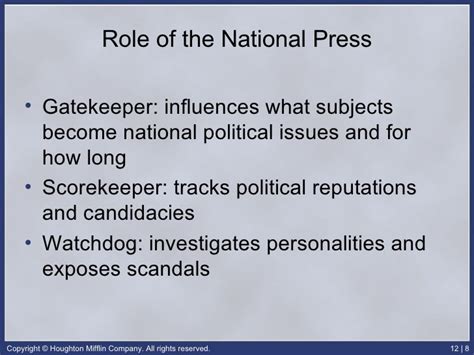Understanding the Role of Watchdogs in American Government

Introduction
In the complex machinery of American government, watchdogs play a crucial role in ensuring accountability, transparency, and ethical conduct. These independent entities, tasked with overseeing government activities, serve as vital safeguards for the public interest. This article explores the definition, functions, and importance of watchdogs in the context of American government.
Definition of a Watchdog
A watchdog, in the context of government, refers to an independent entity charged with monitoring and overseeing the activities of public officials, agencies, or departments. Watchdogs are designed to hold government accountable, promote transparency, and prevent corruption or misconduct.
Types of Watchdogs
Watchdogs in American government can take various forms, including:
- Government Accountability Office (GAO): A nonpartisan agency that provides financial and performance audits of government programs and operations.
- Congressional Oversight Committees: Standing committees in Congress that oversee specific government agencies and issue subpoenas to compel testimony and documents.
- Independent Counsel: A special prosecutor appointed by the court to investigate allegations of wrongdoing by high-level officials.
- Inspectors General (IG): Independent entities within government agencies that investigate waste, fraud, abuse, and mismanagement.
- Nonprofit Organizations: Nonpartisan organizations that conduct investigations, file lawsuits, and advocate for government transparency and accountability.
Functions of Watchdogs
Watchdogs perform several essential functions within the American government system:
- Oversight: Monitoring government activities, identifying potential issues, and holding officials accountable for their actions.
- Investigations: Conducting in-depth investigations into allegations of wrongdoing or misuse of funds.
- Reporting: Issuing reports that detail findings, make recommendations, and provide information to the public.
- Advocacy: Championing transparency, accountability, and ethical conduct in government.
- Education: Raising awareness about the importance of government oversight and encouraging citizen engagement.
Importance of Watchdogs
1. Ensuring Accountability: Watchdogs enforce principles of accountability by scrutinizing government actions, identifying misconduct, and holding officials responsible for their decisions.
2. Promoting Transparency: Watchdogs increase government transparency by compelling disclosure of information, releasing reports, and providing access to public records.
3. Preventing Corruption: Watchdogs act as deterrents to corruption by exposing wrongdoing, punishing misconduct, and promoting ethical standards in government.
4. Safeguarding Public Trust: Watchdogs play a pivotal role in restoring and maintaining public trust in government by holding officials accountable, promoting transparency, and reducing the potential for wrongdoing.
5. Empowering Citizens: Watchdogs empower citizens by providing information, empowering them to hold government accountable, and ensuring their voices are heard.
6. Fostering a Culture of Responsibility: Watchdogs cultivate a culture of responsibility within government by establishing clear expectations, accountability mechanisms, and consequences for misconduct.
Conclusion
Watchdogs are indispensable components of the American government system, acting as vigilant eyes that ensure accountability, transparency, and ethical conduct. Through oversight, investigation, reporting, advocacy, and education, watchdogs play a crucial role in safeguarding the public interest, preventing corruption, and empowering citizens to participate in the democratic process.
Strengthening Watchdogs
To enhance the effectiveness of watchdogs, several measures can be considered:
- Increased Funding: Providing adequate funding to watchdogs ensures they have the resources to conduct thorough investigations and issue timely reports.
- Independence: Safeguarding the independence of watchdogs from political influence or undue pressure is paramount to ensure objective and impartial oversight.
- Enhanced Authorities: Empowering watchdogs with subpoena powers and the ability to compel testimony can strengthen their investigative capabilities.
- Public Engagement: Encouraging citizen involvement and empowering civil society organizations can amplify the reach and impact of watchdogs.
- Innovation: Exploring innovative technologies or methodologies to improve oversight and investigation techniques can enhance the efficacy of watchdogs.
Empowering the Public
Empowering the public is essential for effective watchdogging. Citizens can actively participate in holding government accountable by:
- Staying Informed: Reading reports and news articles about government activities and investigations to stay informed about potential issues.
- Engaging with Watchdog Organizations: Volunteering or donating to organizations that advocate for transparency and government accountability.
- Contacting Elected Officials: Reaching out to representatives to express concerns, request investigations, or support watchdog efforts.
- Attending Public Hearings: Participating in public hearings held by watchdog agencies or congressional committees to provide input and witness proceedings.
- Educating the Community: Raising awareness about the importance of government oversight and the role of watchdogs within the democratic process.
Conclusion
The strength of American government lies in its system of checks and balances, which includes the vital role of watchdogs. By embracing the principles of accountability, transparency, and ethical conduct, watchdogs ensure that government remains responsive to the will of the people and serves the public interest. Through continued vigilance and innovation, watchdogs will continue to play a pivotal role in shaping the future of American governance.
